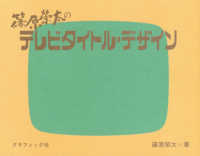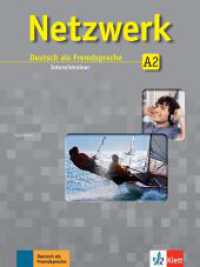- ホーム
- > 洋書
- > 英文書
- > Literary Criticism
Full Description
This book examines how three exiled Jesuits from colonial Mexico—Rafael Landívar, Francisco Clavijero, and Pedro Márquez—shaped the discourse of continental emancipation from Spain. By considering their works in relation to critical debates about the root causes of the international expulsion and suppression of the Jesuits and scholarship about the Spanish American Wars of Independence, Luis Ramos examines these pivotal events as inextricably linked. All three authors arrived in Italy at different stages of their spiritual and intellectual development and extolled their homeland through similar and distinct strategies of representation. They instilled in their compatriots a bolder understanding of colonial Mexico's place within the broader Republic of Letters while prompting their Italian readers to question their assumptions about the New World. They broadened the horizon of an eighteenth-century European reading public eager for the most reliable information about the New World and gave the discourse of creole patriotism a past, present, and futurist dimension. In so doing, Landívar, Clavijero, and Márquez established the spatial and political parameters of an emerging continental poetics of independence, and their works served as a wellspring of literary inspiration that subsequent authors from Spain's recently emancipated colonies would draw from.
Contents
List of Illustrations
Acknowledgements
Introduction: an intellectual polemic gives birth to a New World literary genre
Chapter 1: Enemies of the enlightened state: Francisco Clavijero on exiled Jesuits, sovereign power, and the contested futures of Spanish America
Introduction
Recovering the Spanish American Jesuit diaspora in late Settecento Italy
Reform Catholicism and the enlightened state
A baroque critique of empire in an age of reason
Counter-Reformation tradition against enlightened renovation
Transregional dimensions of the Jesuit expulsion from the Hispanic world
Anticipating independence
Conclusion
Chapter 2: Creole patriotism at a crossroads: mapping New Spain in Rafael Landívar's Rusticatio mexicana
Introduction
Mapping New Spain
Poetry and exile
New World sublime
A poetics of restoration
Creole patriotism at a crossroads
Allegories of racial harmony
Patriotism and enlightenment
Toward a poetics of independence
Conclusion
Chapter 3: Sacralizing Mexico in an age of reason: nostalgia and divine providence in Francisco Clavijero's Storia antica del Messico and Breve ragguaglio
Introduction
The politics of translation: between Spanish and Italian reading publics
Against climate theory
Natural wonders and iconic landscapes
Recasting New Spain's agriculture in a global framework
A poetics of nostalgia
Inventing antiquity and foreshadowing conquest
From Vico to Boturini: New World history and divine providence
Expelling the devil from the New World
Rethinking the conquest of Mexico in an age of reason
Conclusion
Chapter 4: Antiquity in an age of revolution: Pedro Márquez on the transatlantic cultures of classical revival and universal rights
Introduction
Pedro José Márquez, José Nicolás de Azara, and the cultures of classical revival in late Settecento Rome
Antiquarian studies and the shifting parameters of race and universality
From Naples to Mexico City: classical revival in the global Hispanic world
Decentering Europe in the Republic of Letters
Translation as cultural vindication
Recasting the Mexica as historical agents
Comparing Mesoamerican and Mediterranean expressions of sacred violence
Cosmopolitanism from below
Toward a new language of universal rights
Conclusion








